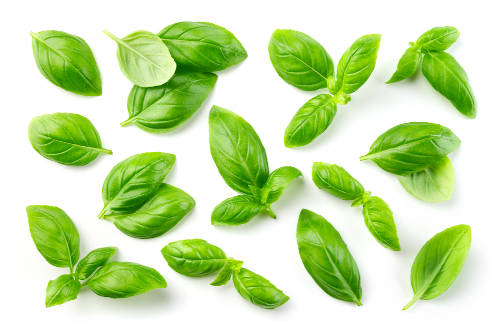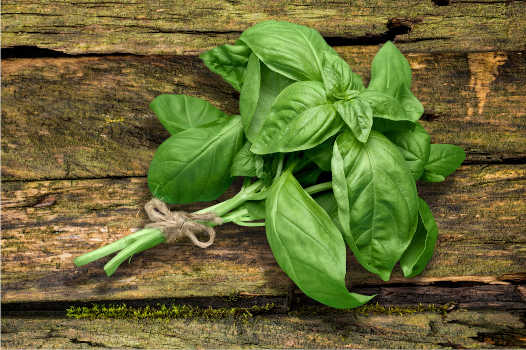Basil (Ocimum basilicum) is one of the signature flavors of Mediterranean cooking. To cooks, it’s the king of herbs. To the Hindu religion, it’s the manifestation of a goddess.
Witches drank it to fly, and lovers exchanged it. All around the world, this member of the mint family is as known for its magical uses and colorful folklore as it is for its bold flavor.
Magical Properties of Basil
Basil is an herb of money and success. Some varieties, specifically holy basil, are said to keep away negative energy and entities. One piece of folklore holds that “where basil grows, no evil goes.”
Some old formulas for purification, protection, and love include basil. It’s a key ingredient in many spells for luck during travel (or even just astral travel).
Most of basil’s virtues seem to stem from its powers of attraction. Keeping basil leaves in one’s wallet will attract money. Soaking basil in water, then sprinkling it over the threshold of a business or using it as a door wash will attract customers. Dusting oneself with basil will keep one’s lover attentive.
Interestingly, in English folk magic, basil was often used as a repellent — it kept both pests and harmful magic at bay. According to some other legends, basil is also used to prevent madness and soothe arguments. Fresh basil juice may have been part of witches’ flying rituals.
Basil is ruled by Mars and the element of fire.
Benefits & Uses of Basil
Basil contains multiple antioxidant compounds, which vary depending on the variety. All basils are rich in lutein, zeaxanthin, and beta-carotene. Lemon basil also contains the volatile compound limonene, while sweet basil contains eugenol. These protect the body against oxidative stresses and free radical damage.
In studies involving rats, basil helped lower blood sugar. This may make it useful for people with type 2 diabetes.
Natural compounds in basil may help alleviate symptoms of depression and anxiety in some individuals. It may also improve concentration and memory.

Basil’s antioxidant and anti-inflammatory compounds can help reduce the risk of heart disease. Eugenol, the compound in sweet basil responsible for it’s spicy, clove-like flavor, can act as a calcium channel blocker, lowering blood pressure.
Other compounds in basil have a beneficial effect on blood lipids. Overall, this makes the herb a helpful addition to a heart-healthy diet.
Possible Risks & Side Effects of Basil
As with any herb, allergies are possible. Symptoms of an allergic reaction can vary widely, ranging from a mild rash, to swelling and itching of the lips and tongue, to anaphylaxis. If you are allergic to basil or any of its relatives, substitute another herb instead.
Since basil can lower blood pressure, people with normal or low blood pressure should avoid consuming it in large quantities. Moderate consumption by otherwise healthy people is safe.
Consuming large quantities of basil may make it difficult for some people to control their blood sugar. If you’re on medication to lower your blood sugar, talk to your doctor before taking basil supplements. Your medication may need to be adjusted.
Basil essential oil can irritate skin and mucous membranes. Never use any essential oil neat — always dilute it with a suitable carrier oil first. Basil oil is generally safe for use in concentrations below 6%.
One of the compounds in basil is called estragole. Estragole can increase the risk of developing liver cancer. This is typically only a concern for people who consume large quantities of basil, such as supplements.
Basil History & Folklore
Basil has a rich history. Cultivated for over 5000 years, its known as one of the kings of culinary herbs. Interestingly, the word “basil” comes from the Greek term “basileus,” meaning “king.”
Holy basil is considered a sacred herb within the Hindu religion. It’s a living manifestation of the goddess Tulasi.
She was deified by the god Vishnu after killing herself, either after discovering she’d accidentally been unfaithful to her husband, or out of grief at his passing. Her plant, the tulsi, is a symbol of fidelity, protection, and enduring love.

European folk beliefs about basil are divided. Some traditions hold that it’s a holy herb — holy enough to grant safe passage to the afterlife when placed in the hand of the deceased.
Others felt that the herb was evil, and growers must curse at the ground as they plant it or it will never thrive. African folklore held that basil would repel scorpions, while the Greek people believed that scorpions bred near basil.
In Romania and Italy, basil is a symbol of love.
Getting Started With Basil
As a common culinary herb, it’s easy to get start with basil. You can purchase it dried, fresh, or potted from most supermarkets.
As long as you keep a pot of fresh basil in a sunny spot and water it regularly, it’ll reward you with abundant fresh, vibrant green leaves that you can use fresh or dried.
The easiest way to use basil is as a powder. Place dried basil leaves in an herb grinder or mortar and pestle, and reduce them to a fine dust.
As you do this, visualize energy flowing into and mingling with the leaves. Ask the basil for its help — whether you plan to use it for love, protection, luck, or something else entirely.
When you feel that the powder is ready, you can sprinkle it in your home, place of business, wallet, or use it as a dusting powder.
Today, basil comes in varieties that taste like everything from anise, to lemon, to camphor. Some types are purple, while others are a bright green. No matter which variety you prefer, basil it a deeply magical, powerful ally to cultivate a working relationship with.
